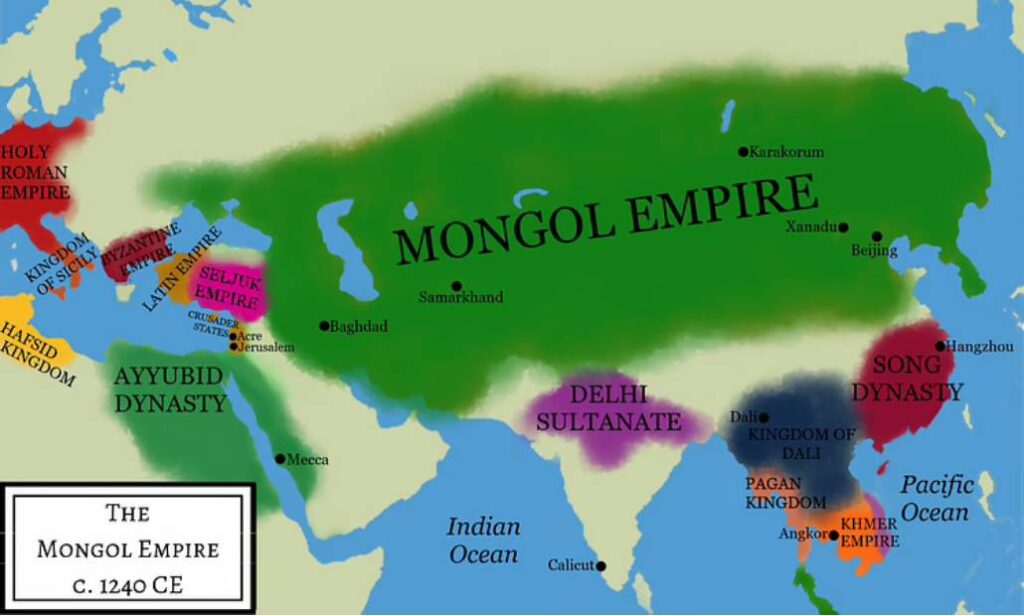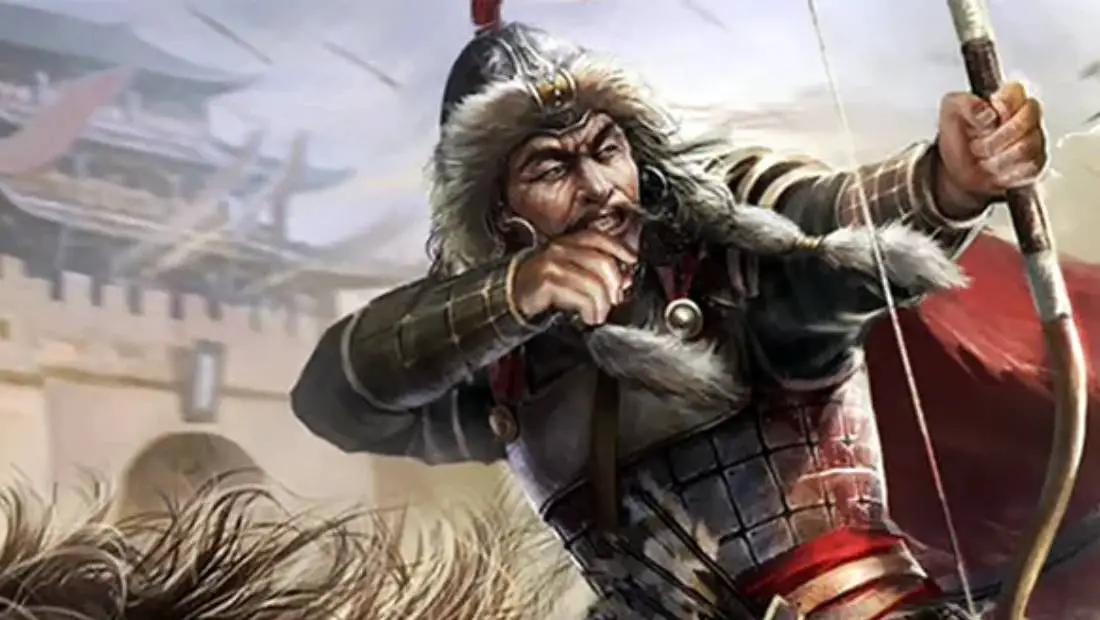Of all the generals of Mongol empire, none stand taller than Subutai. His reputation as a ferocious warrior was well known which earned him a place as Genghis Khan’s “4 dogs of war”.
Unlike Genghis’s 4 horses who were Genghis Khan’s personal friends the 4 dogs were the deadliest of his warriors. Brutal, fearless and utterly loyal the 4 dogs were responsible for the empire’s expansion.
The Mongol Empire, a glorious and triumphant supremacy is known to the world for the conquests of its paramount ruler, Genghis Khan.
Truth be told, the empire rose to vigour as a result of the blood and sweat of Subutai, a heroic Mongol General and the nexus of Genghis Khan’s military.
This article revisits the life and contributions of this unsung warrior.
Antecedents
Subutai was born in 1175, near the Onon River in present day Mongolia, to a forest dwelling family, belonging to the Uriyangqai clan. Scholars believe him to be next of kin to Genghis Khan, keeping in mind the etymological similarities of their clan.
His familial occupation of herding reindeers was loomed over by the steppe Mongols, labelling him as a pariah. Not conforming to the occupational boundaries of his clan, Subutai left his household at the tender age of 14, to join the imperial army of Genghis Khan.
Route to the top
As an adolescent, Subutai was posted as Genghis Khan’s chaperon. The constant interaction between him and the emperor, made him a familiar face to the Great Khan, resultingly actualizing a bond of trust between the two.
Subutai successfully earned the awarding title of “Bagatur”, meaning Valiant for himself. Gradually, around his early twenties, Subutai could attend strategic military meetings while also being a neophyte to Jebe, general of the Mongol Army at that time, accompanying him on several conquests.
One of his momentous actions was to charge against the Merkit in 1197. At the forefront, Subutai obliterated an entire Merkit camp alone, near the Tchen River using psychological warfare tactics proving himself to be utterly resourceful.
Most powerful General
Within a decade of being the emperor’s escort, Subutai was promoted as the Military General and chief strategist of the Mongol Army. He proudly carried the weight of being one of the four “dogs of war” of Genghis Khan.
Subutai had a unique sense of warfare and was exceptionally quick witted in planning ambush and manoeuvring the army for their benefit.
He led and triumphed over perfectly devised sieges against the enemy. Subutai’s tactics, along with Genghis Khan’s gallantry, ramped the reputation of Mongol warfare creating a dynamic imagery among adversaries.
Not only a gifted warrior, Subutai was also an excellent administrator of siege warfare. Quite proficiently, he utilised siege weapons and artilleries to bombard enemies, not sparing them of causalities.
He was dearly known to incorporate domiciles and captives of conquered lands into his army, giving them a fair chance to start anew in life. Subutai tactically employed them as human resources to engineer weapons, spy on adversaries and as workmen.
Battle of Mohi
The Battle of Mohi, was a cardinal occurrence in the life of Subutai. Being his inceptive skirmish, it was in this battle that Subutai gained his prized title of being the Greatest Military General by eloquently showcasing his wit and tactics.
Mongolia and Hungary clashed at the battleground near Mohi, in 1214. This annexation was under the project of Genghis Khan’s Mongol invasion, headed by Subutai.
The use of copious machinery by the Mongol army gave them an upper hand over their Hungarian counterparts. Under Subutai’s leadership, the army executed a triangular attack. An elephantine vanguard barraged through Poland, annihilating the Polish army under Duke Henry II.
Another troop set forth towards Transylvania, defeating the vain army in a swift. The main infantry, headed by Khan Batu and Subutai invaded through a fortification and besieged the Hungarian army, claiming victory over the battle.
Subutai’s skill and strategizing abilities were flaunted to the world, when the Hungarian army destroyed a bridge, carrying the Mongol cavalry and infantry to the other side of the river, inflicting damage and casualties upon the Mongol army.
However, Subutai vowed not to rest until he had tasted victory, he ordered for stone throwers, propelling giant rocks towards the Hungarian army, clearing the bank of enemies while at the same time allowing his cavalry to pass through. Utterly startled and dismayed the enemy could be promptly defeated.
This was the highlight in Subutai’s career as a General, and for Genghis Khan to recognise this gem under his nose.

Invasion of Xia and Jin
Subutai had a major role to play in the battle against Xia in 1226, serving as the chief commander against the Tanguts. Together with the Khan, Subutai had brainchild a blueprint of surprise attack to capture Xia.
According to his gameplan, Genghis Khan attacked Xia by a foreseen Northern route, engaging their army and leaving them unprepared to face the ambush of Subutai and his army from the mountains of the West. The Mongols had successfully captured Xia in 1227.
However, their pursuit of Jin was interrupted by the death of Genghis Khan in 1227 and the succession Ogedei as the Khan. Now, Subutai shouldered the role of escorting Mongolia to victory.
In the year 1230, Ogedei led the Mongol army to revive the unfinished clash against Jin. This attempt emerged out to be a failure as subutai was defeated at Shan-ch’e-hui.
In 1232, the Mongol army strived for another attempt at capturing Jin with the intention of undoing their previous humiliation. This time, Subutai could navigate his army to a crushing victory against the enemy.
Ogedei returned to Mongolia along with his troops in 1233, leaving a fraction of the infantry at Subutai’s command to defeat the armies at Honan. After 2 years of constant battle, Subutai could finally bring home the vanquish of Jin and its neighbouring territories.
Legacy and Demise
Throughout his lifetime, Subutai conquered over 32 nations and triumphed 65 battles for Mongolia. His concluding war was against the Song Dynasty in 1246 were he received much appreciation for valour and gallantry.
He retired at the age of 71, returning to Mongolia and spending the few years left of his life in solitude, near the Tuul River. He succumbed to death at the age of 72.
The life of Subutai is worth celebrating. His fearless attitude, bold approach and heroic personality has aptly awarded him the title of being the most charging military general, following the footsteps of Alexander the Great.

